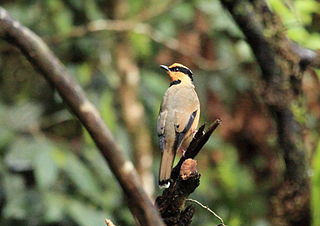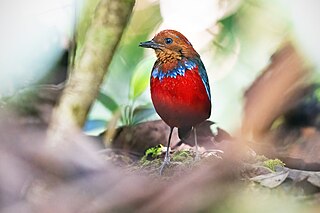
Pittas are a family, Pittidae, of passerine birds found in Asia, Australasia and Africa. There are 44 species of pittas, all similar in general appearance and habits. The pittas are Old World suboscines, and their closest relatives among other birds are in the genera Smithornis and Calyptomena. Initially placed in a single genus, as of 2009 they have been split into three genera: Pitta, Erythropitta and Hydrornis. Pittas are medium-sized by passerine standards, at 15 to 25 cm (5.9–9.8 in) in length, and stocky, with strong, longish legs and long feet. They have very short tails and stout, slightly decurved bills. Many have brightly coloured plumage.

Gurney's pitta is a medium-sized passerine bird. It breeds in the Malay Peninsula, with populations mainly in Myanmar. The common name and Latin binomial commemorate the British banker and amateur ornithologist John Henry Gurney (1819-1890). Its diet consists of slugs, insects, and earthworms.

The red-breasted partridge, also known as the Bornean hill-partridge, is a species of bird in the family Phasianidae. It is endemic to hill and montane forest in Borneo, preferring bamboos and thickets. The International Union for Conservation of Nature (IUCN) has assessed it as a least-concern species.

The fruithunter or fruit-hunter, also known as the black-breasted fruit-hunter, is an enigmatic species of bird currently placed with the typical thrushes in the family Turdidae. It is endemic to forests on the south-east Asian island of Borneo.

The Bornean blue flycatcher is a species of bird in the family Muscicapidae. It is found in Brunei, Indonesia, and Malaysia, where it is endemic to the island of Borneo. Its natural habitat is subtropical or tropical moist montane forests.

The blue-banded pitta is a species of bird in the family Pittidae. It is endemic to the island of Borneo, where it is found in all three countries that share the island: Malaysia, Brunei and Indonesia. Its natural habitat is subtropical or tropical moist lowland forest.

The blue-headed pitta is a species of bird in the pitta family Pittidae. It is endemic to Borneo.

The giant pitta is a species of bird in the family Pittidae.

The blue pitta is a species of bird in the family Pittidae found in the northeastern Indian subcontinent, southern China, and Indochina. It typically lives in moist forests but can also inhabit dry forest. It is an unobtrusive, solitary bird which feeds by foraging on the ground for insects and other small invertebrates.

The bar-bellied pitta is a species of bird in the family Pittidae. It is found in Cambodia, Laos, Thailand, and Vietnam. Its natural habitat is seasonal tropical forest.

The banded pittas, Hydrornis (guajana) spp., are a group of birds in the family Pittidae that were formerly lumped as a single species, the banded pitta. They are found in forest in the Thai-Malay Peninsula and the Greater Sundas.

The blue-naped pitta is a species of bird in the family Pittidae.

The rusty-naped pitta is a species of bird in the family Pittidae.

The eared pitta is a species of bird in the pitta family, Pittidae, and is found in Southeast Asia.

Schneider's pitta is a species of bird in the family Pittidae. It is endemic to Sumatra in Indonesia. Its natural habitat is subtropical or tropical moist montane forest. It is threatened by habitat loss. It was rediscovered in 1988 after last being seen in 1918.

The blue-rumped pitta is a species of bird in the family Pittidae. It is found in Cambodia, China, Laos, Thailand, and Vietnam. Its natural habitats are subtropical or tropical moist lowland forest and subtropical or tropical moist montane forest.

The black-crowned pitta, also known as the black-headed pitta, black-and-crimson pitta, black-and-scarlet pitta or black-crowned garnet pitta, is a brightly coloured, ground-dwelling, bird species in the pitta family. It is endemic to the Southeast Asian island of Borneo. It was described by John Gould in 1877, with the type locality recorded as the Lawas River in northern Sarawak.

The Dulit partridge, also known as Hose's partridge, has been considered a distinctive subspecies of the long-billed partridge, a bird in the Phasianidae, or pheasant, family. It is endemic to Borneo, where it appears to be separated altitudinally from the nominate subspecies, and is often considered now to be a full species, Rhizothera dulitensis. It is little-known, rare, and has not been recorded since 1937.

The Javan banded pitta is a species of bird in the family Pittidae. It is found in Java and Bali. It was formerly considered conspecific with the Bornean and Malayan banded pittas. Together, they were referenced as the banded pitta.

The Malayan banded pitta is a species of bird in the family Pittidae. Other common names include the blue-tailed pitta, the Irene's pitta, the banded pitta and the Van den Bosch's pitta. It is found in Thailand, the Malay Peninsula and Sumatra. It was formerly considered conspecific with the Bornean and Javan banded pittas, together they were referred to as the banded pitta, but now they are considered to be separate species.






















